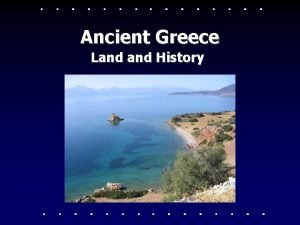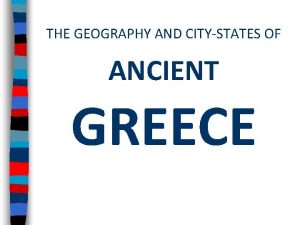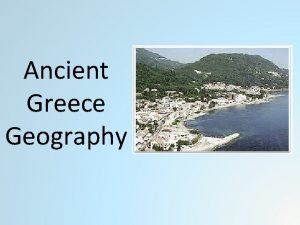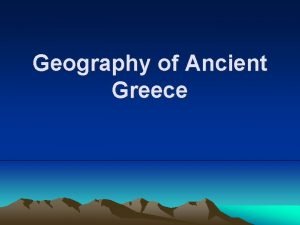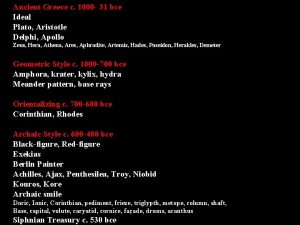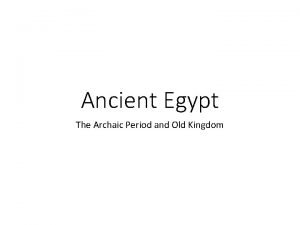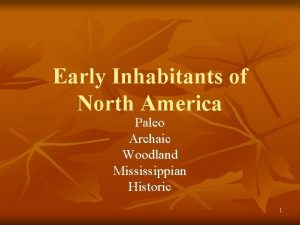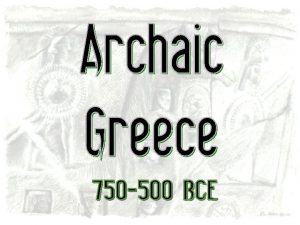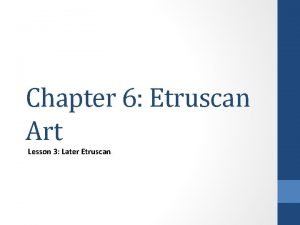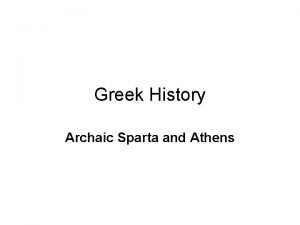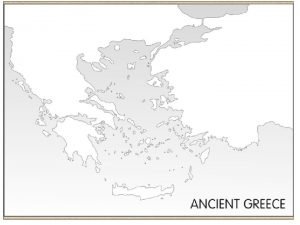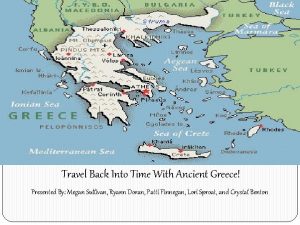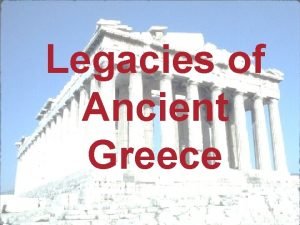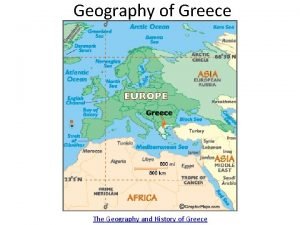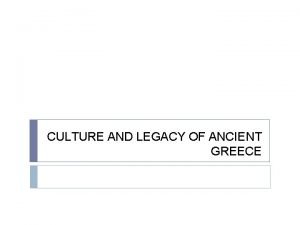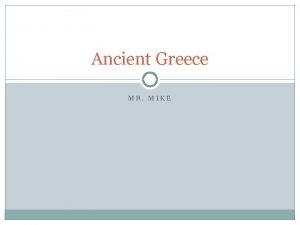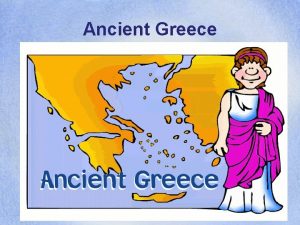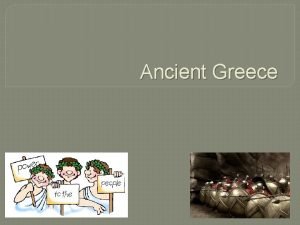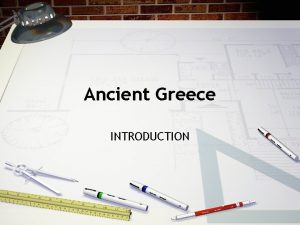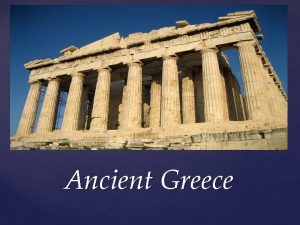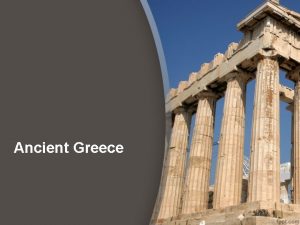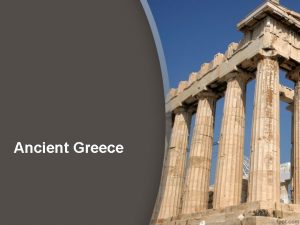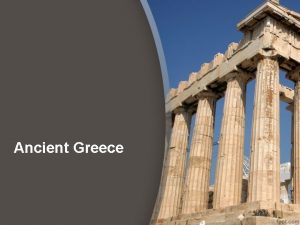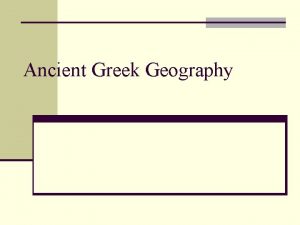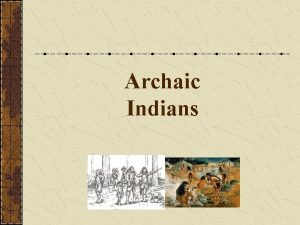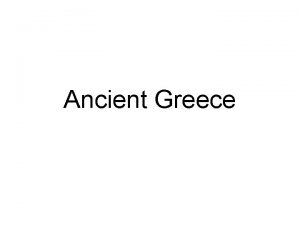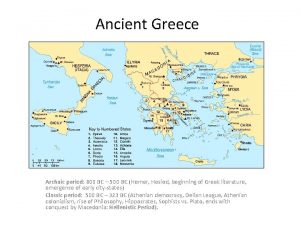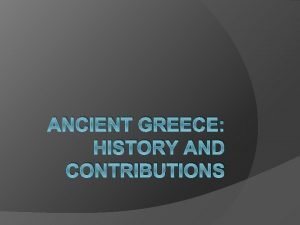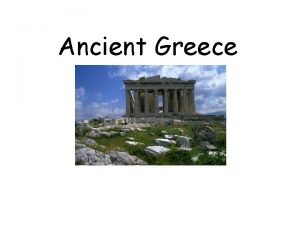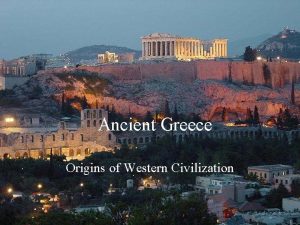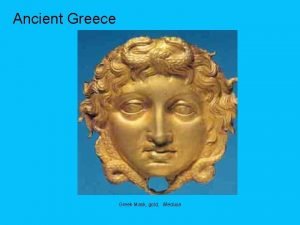Ancient Greece Land History Overview Geography Environment Archaic


























- Slides: 26

Ancient Greece Land History

Overview • Geography & Environment • Archaic Period & The Rise of The Polis • Colonies & Tyrants • Athens & Sparta • The Persian Wars • The Peloponnesian Wars • Alexander the Great Oracle at Delphi

Rise of the Greeks • Greeks were resource poor – Poor soil – Mountain chains – No large river systems ancient Greek shipping • Consequences – Oriented to the ocean – Stimulated geography, history – Rivalry with Persian Empire Persian King Darius III

The Middle Sea – Uniform ecozone: climate, plants, animals – Hot summers, stormy winters – Easy to travel • sea as connector, not barrier Mediterranean

Geography • Aegean Sea coastlines • Empire included – Mainland Greece – Many islands – Ionia: western Asia Minor • Exploiting the sea – Fishing – Trading – Mercenary soldiers

Environment • Unstable geology – Volcanic zone • European and African tectonic plate contact • Frequent earthquakes Oracle of Apollo at Delphi – Consequences • Religion of oracles • Deforestation – Probably during Iron Age (800 BC) – Consequences • Used stone for building Ephesus Valley

Resources By Land • Arable land – Thin topsoil, limited rainfall, no large river systems • Limited carrying capacity – Dry farming • Barley, olives, grapes • Sheep, goats • Building stone – Marble • Clay for pottery • No timber, metals Marble quarry - Naxos

Resources By Sea • Coastline with natural harbours – Difficult travel overland • Ports of Call – Northern Aegean • timber – Anatolia • gold, iron – Cyprus • copper – Western Mediterranean • tin – Black Sea, Egypt, Sicily • grain

Early History • Minoan – Crete 2000 - 1450 BC – Palaces, writing, statuary • Mycenaean – 1600 - 1150 BC – Palace states, centralized economy, fortifications • Extensive trade – Mediterranean ports – Wine, oil, metals, grain – Piracy and conquest

Minoan and Mycenaean Lion Gate - Mycenae Palace of Minos - Knossos

Atlantis and Santorini • Plato’s legend • Atlantis lost civilization that sank beneath the sea • Minoan period Santorini – volcanic eruption 1600 BC – destroyed island of Thera – caused climate change, decline of Minoan civilization

Archaic Period • Dark Ages – 1150 - 800 BC – collapse of empires eastern Mediterranean – loss of trade & knowledge, isolation • Phoenician traders – arrived 800 BC – brought trade, writing system – population explosion • Intensive farming • Available imports Phoenician traders

The Rise of the Polis • Polis = City-State – Urban centre and rural territory – Rising population - villages merge into cities – Specialized labour - crafts, commerce, religion • Independent Cities – Fiercely jealous – Created rivalry, political and economic conflict

Hoplite Warfare • New warfare – hoplite: heavily armed citizen foot soldier – phalanx: tight, square formation of hoplites • Relation to agriculture – Clash of hoplite lines = quick decision – Survivors returned to fields

Colonization • Population pressure – People left or forced out – founded colonies in • • Aegean Black Sea Libya Southern Italy, Sicily • Impact: new – – Markets Urban planning Forms of government Ideas Colony at Samos

An Age of Tyrants • Feudal kings of Dark Ages replaced with aristocratic councils • Society included – Merchants & craftsmen – Peasant farmers – Debt slaves • City-State Tyrant – 7 th - 6 th cent BC – Held power contrary to established community traditions – Backed by middle class, hoplite forces • Rejection of Tyrant Families – transition from oligarchy - power by wealthy families – to democracy - power by free adult males

Sparta • conquest, not colonies – 7 th cent BC shortage of land – Attacked Messenia in west Peloponnese – Reduced population to status of helots (landless farmers) • fear of uprising – Sparta as military camp – Soldiers owned land, helots worked it – Best army in Greece through training The Peloponnese • Huge personal price • Peloponnesian League – Defensive alliances – Isolationist, thus no cultural development Spartan hoplite

• Solon Athens – Appointed lawgiver 594 BC: crisis over population, oligarchy – Created 4 social classes • Based on farm income • Top three: held office • Bottom: vote only – Abolished debt slavery • The Tyrant Pisistratus – Seized power 546 BC – Created public buildings, festivals • Temple of Athena • City Dionysia – drama festival • Panathenaea - religion, athletics, poetry – Overthrown by 500 BC Solon

Athenian Democracy • Pericles transferred power to – Assembly - legislature – Council of 500 - executive – People’s Courts • Public Office: all men eligible – Elected office • Public finance • Defence – Some offices filled by lot – Paid public servants • Assembly of All Citizens – Public debate of issues – Decisions openly made Pericles of Athens

The Persian Wars • Cyrus conquered Anatolia 546 BC – Put down Ionian revolt 499 BC • Invasion of Greece – Athens defeated Persians at Marathon 490 BC – Invasion by Xerxes 480 BC Battle of Thermopylae • Battle of Thermopylae - 300 Spartans under Leonidas held off army of thousands • Sack of Athens • Battle of Salamis - Themistocles & victory at sea – Persian defeat at Plataea 479 BC • Provisioning large army in the field • Tactical errors at Salamis • Superiority of hoplite arms & training Battle of Salamis


Height of Athenian Power • Delian League – Defensive alliance under Athens • Freed Ionia from Persia • Later dominated by Athens • Athenian Navy – Reinforced democracy • Rowers were from lower classes – Controlled large occupied territory • Tribute paid for works like Parthenon (Athena), development of arts & sciences – Promoted commercial interests Parthenon

The Peloponnesian Wars • Rise of Athens – Control over Delian League – Reaction to sacking • Fortification of city – Double wall linked city with port of Piraeus, supplies by sea • New strategy: delay, refusal to join battle • Sparta – Earthquake & helot revolt 462 BC – Withdrew from conflict • Peace of Nicias 421 BC Spartan hoplite

Alexander the Great • Battle of Chaeronea 336 BC – Philip II of Macedonia defeated Thebes, Athens – Corinthian League & loss of democracy • Alexander, son of Philip II – – 334 BC invasion of Persia Conquest of Persia, India, Egypt Established local rule, Greek-style cities Died 323 BC • Division of Empire – Seleucids in Persia – Ptolemies in Egypt – Antigonids in Macedon & Hellas • Spread of Hellenistic culture

The Hellenistic Age • Greek domination of Middle East – Long lasting impact • Diffusion of Greek culture – Privileged class of soldiers, scholars, administrators – Integration with local culture • Greek Cities – Alexandria The Lighthouse - Alexandria • Library, Museum, Lighthouse – Greek Gymnasia • Taught alphabet, writing Alexander Gate - Jerusalem

Next Lecture • Ancient Greece Cities
 Ancient greece land
Ancient greece land Greece geography
Greece geography Geography in ancient greece
Geography in ancient greece Ancient greek map
Ancient greek map Describe the geography of ancient greece
Describe the geography of ancient greece About 80 percent of the geography of greece is
About 80 percent of the geography of greece is Shakespeare archaic words
Shakespeare archaic words Paleo archaic woodland mississippian
Paleo archaic woodland mississippian Shakespeare archaic words
Shakespeare archaic words Ah faustus now hast thou
Ah faustus now hast thou Archaic vase painting
Archaic vase painting Archaic period egypt
Archaic period egypt Aitchison labelling packaging network building
Aitchison labelling packaging network building Paleo archaic woodland mississippian timeline
Paleo archaic woodland mississippian timeline The archaic age
The archaic age Archaic painting
Archaic painting Neutral layer of english vocabulary
Neutral layer of english vocabulary Paleo archaic woodland mississippian timeline
Paleo archaic woodland mississippian timeline Thesmothetae
Thesmothetae Overview of business environment
Overview of business environment Adriatic sea ancient greece map
Adriatic sea ancient greece map Where was ancient greece located
Where was ancient greece located Ancient greece contributions
Ancient greece contributions Greek philosophers in physical education
Greek philosophers in physical education Legacies of ancient greece
Legacies of ancient greece Where was sparta located
Where was sparta located What can we learn from studying ancient greek artwork
What can we learn from studying ancient greek artwork
